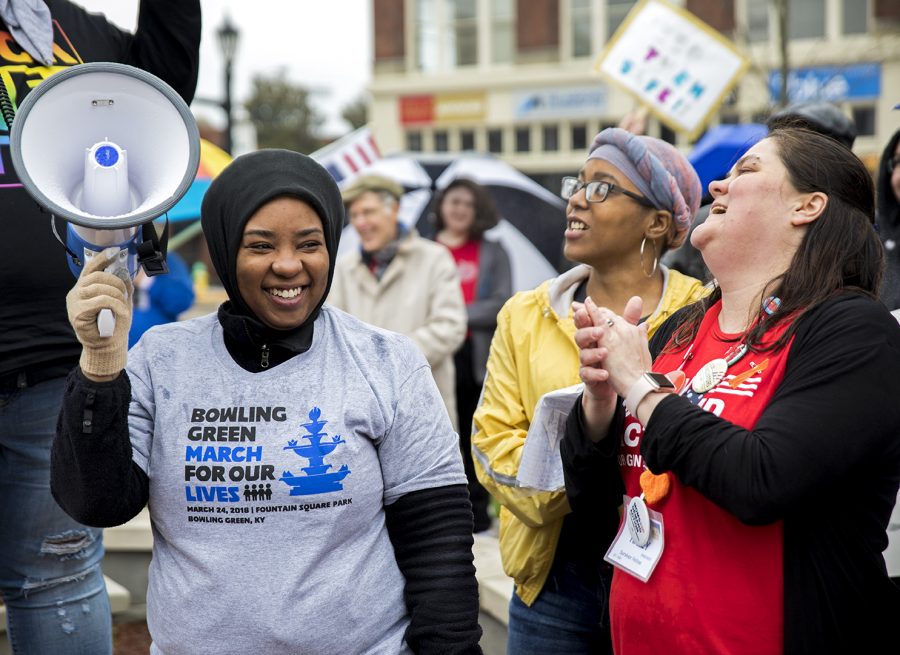Bowling Green community marches for their lives
March 26, 2018
Around 200 Bowling Green residents participated in March for Our Lives despite the 40-degree weather and pouring rain on March 24.
Colorful rally signs ran blurry from the showers, but the overall message was still clear—these activists weren’t backing down.
The March for Our Lives protests were nationwide, originally planned by the survivors of the Marjory Stoneman Douglas High School shooting in Parkland, Florida, where 17 students and faculty members were killed Feb. 14.
Murphy Burke, 21, was one of the organizers for the march.
“I’m very happy with the people who showed up,” she said. “Gun violence doesn’t stop because of the rain, and neither will we … Instead of taking a bus to Washington, we wanted to show Bowling Green was engaged and supportive.”
Parents, high school students, college students, teachers and professors marched from Henry Hardin Cherry Hall to Fountain Square Park. The participants donned buttons objecting the NRA and held up signs demanding change from Congress. Various chants and phrases were shouted with each stride: “This is a student lead movement!” “We are the future!” “We’ve had enough!”
The protesters ended at Fountain Square Park where speeches were delivered, T-shirts were sold and socializing over a similar struggle occurred.
Elizabeth Heller, 36, is a stay at home mother to an 8-year-old son and a 3-year-old daughter. She held up a sign stating “Kids Over Guns” while her three-year-old daughter had an ominous sign asking, “Am I Next?”
“The Florida teenagers are inspiring,” she said. “I want those children to know that they have a voice and the adults have their back. I’m here for solidarity.”
Leah Ashwill, 41, is the director of WKU’s Center for Citizenship and Social Justice, which organized the march and did so in partnership with Black Lives Matter and the LGBTQ community.
“In order for things to change in this country, it requires every individual to take action by voting for appropriate causes,” she said. “This march exceeded my expectations. Seeing the marchers was moving.”
Samantha Massie, 18, an education major, recently graduated high school and has a personal experience with gun violence at her old school. At Greenup County High School, gun threats were a common occurrence, and she once had to hide under a table for hours because of it. After graduating, she now fears for her little sister’s safety, which influenced her sign questioning if her little sister was next alongside the deceased Parkland shooting victims’ names.
“I’m here because I want more gun regulations and proper mental health checks,” she said. “I’m also here for the unity, for the collective group of people trying to create a positive change.”
The official New York City branch of March for Our Lives outlined goals they want Congress to enact, such as banning the sale of assault weapons and banning the gun show loophole, according to Paper. According to CNN, the main march was held in Washington, but over 800 sister marches were hosted across the country, such as the one in Bowling Green.
News reporter Lora Sparks can be reached at 270-745-6011 and [email protected].





















![Students cheer for Senator at Large Jaden Marshall after being announced as the Intercultural Student Engagement Center Senator for the 24th Senate on Wednesday, April 17 in the Senate Chamber in DSU. Ive done everything in my power, Ive said it 100 times, to be for the students, Marshall said. So, not only to win, but to hear that reaction for me by the other students is just something that shows people actually care about me [and] really support me.](https://wkuherald.com/wp-content/uploads/2024/04/jadenmarshall-600x422.jpg)

